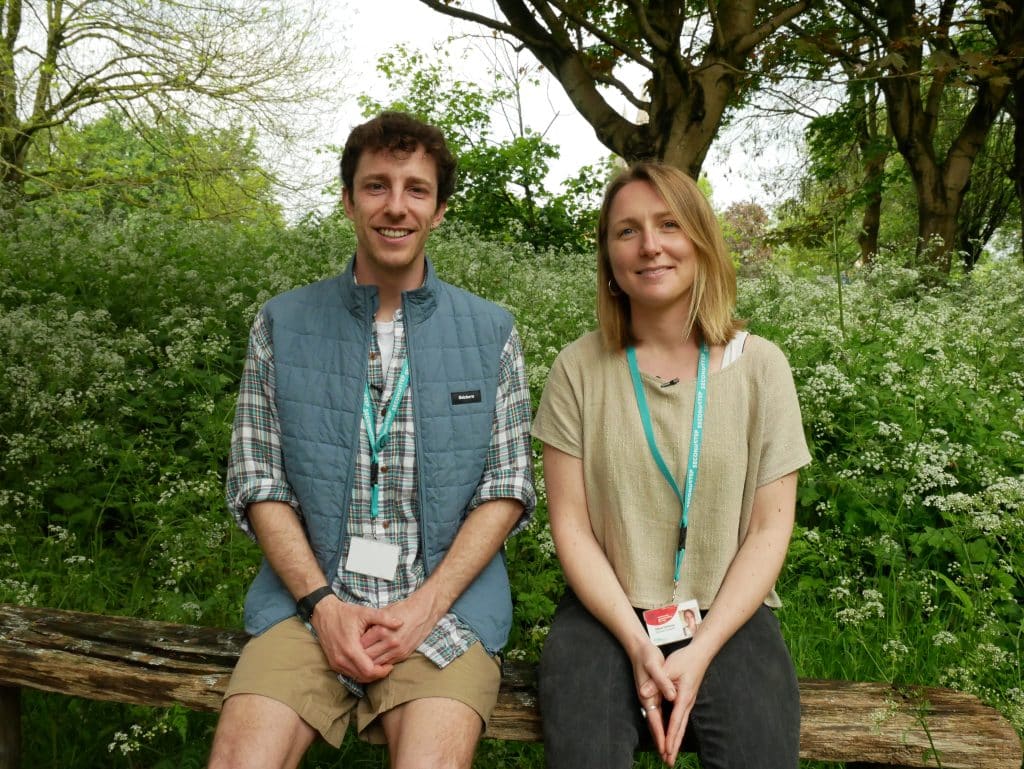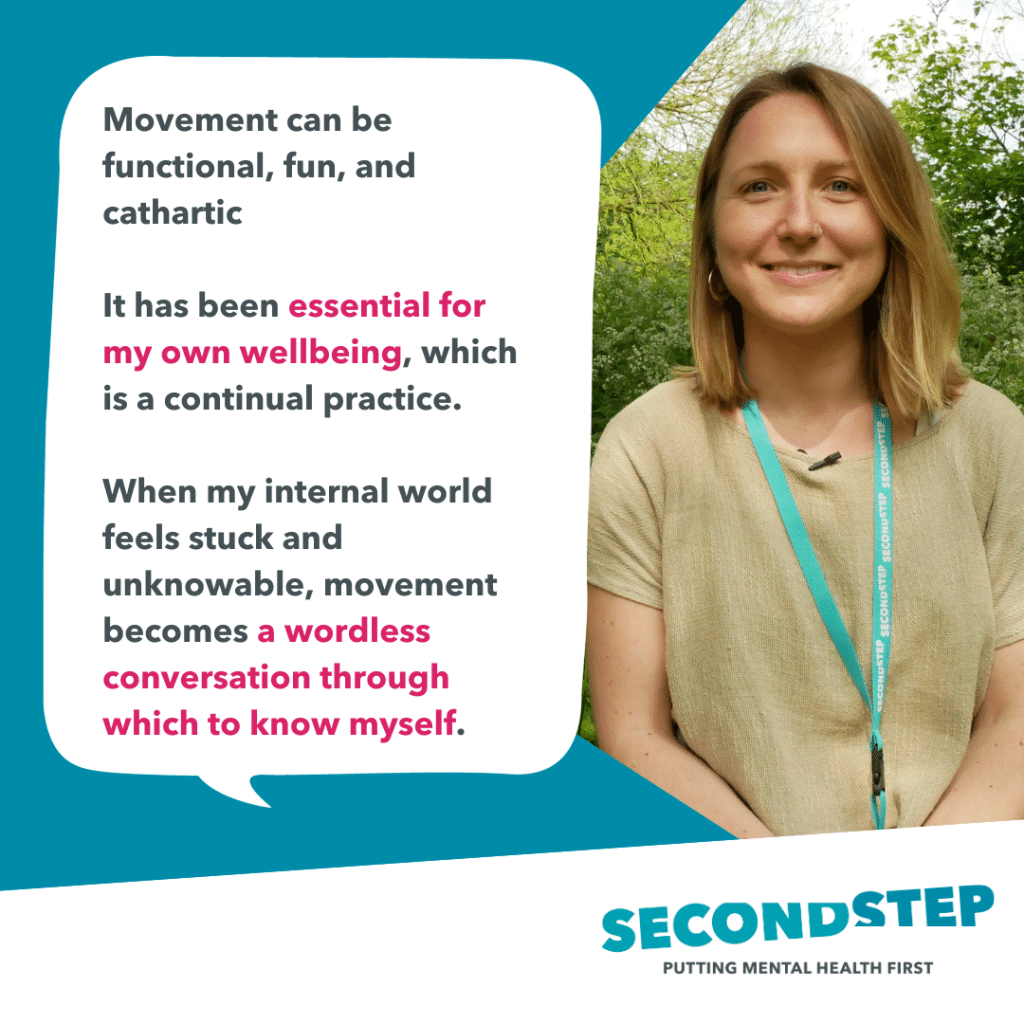Embracing movement: Navigating mental health and wellness
This year’s Mental Health Awareness Week has the theme of movement so we caught up with Senior PAT Practitioner Ellen Grieves and Bristol Wellbeing College tutor Tom Beetham to discuss what movement means to them.

Living more from the body
“Movement can be functional, fun, and cathartic,” says Ellen. “It can generate feelings of freedom, strength, balance, and it can connect us to ourselves, each other, and the wider web of life.
“Movement has been essential for my own wellbeing, which is a continual practice. When my internal world feels stuck and unknowable, movement becomes a wordless conversation through which to know myself.
“When I found yoga, an ancient practice and human technology from India and South Asia, it changed my life. It offered a way to explore experientially how I’ve learned to respond to life and to practise something different that felt more life-affirming. It wasn’t easy or comfortable to listen-in at first, but the teachings of Yoga provided a framework to learn how to come into a healthier and more compassionate relationship to myself and the world. This was a gateway for me to discovering authentic and mindful movement practices and to begin a journey of living more from my body.”

What is embodied living?
“By having a dialogue with my body through movement, I developed interoception – the ability to sense my internal bodily sensations and emotions. This allowed me to better understand my body’s signals in different situations and respond more effectively to my feelings and needs. My body felt freer and more open.
“I discovered I could influence how I felt through this practice, not to avoid emotions, but to resource and energise myself to deal with what was present from a more balanced and perceptive state. This gave me a sense of agency, skills, and the ability to respond to life in an empowering way. However, it’s an ongoing journey that requires continued effort and compassion.“
The value of routine
“I do some form of movement most mornings to generate energy and refresh my systems,” Ellen continues. “Sometimes that’s Yoga, Qigong, or a run. And sometimes it’s putting on a song and moving in an honest and unstructured way, or just having a little shake. This year I’ve discovered walking meditation, walking intentionally in a line very slowly back and forth whilst cultivating mindful practice. Sounds boring, but I’ve found this to be a powerful practice to cultivate qualities through the way I move, such as gentle attentiveness, kindness, or peace.”
Movement, nature, and connection
“Movement connects me to a lot more than just myself, I feel in contact with place, wildlife, Earth, Air, Water, Fire (temperature). Being mindful of the elemental qualities in my movements, breath, fluidity, solidity, space. I learn a lot from observing movement in the natural world, cognitive connection. Movement also connects me to other people, whether that’s the mutual motivation of a Parkrun or celebrating together through dance.”
The benefit of movement in recovery and work
“Bristol Wellbeing College is just one of Second Step’s services doing powerful work in the community to highlight the many benefits of movement, for all aspects of our health,” explains Tom. “Through our Mind and Movement workshops, we discuss some of the positive chemical, emotional, and physiological impacts of movement, before supporting learners in planning and implementing their own movement goals based on their individual wants and needs.”
“In addition to this, the College has also expanded its offering of Mindful Walk workshops that take place across the city, giving learners the opportunity to connect, learn and practice mindful techniques in the great outdoors.”
Ellen adds: “In the Community Rehab, we recognise the importance of physical health as part of rehabilitation work, supporting clients to follow their interests and try new activities. Here is a quote kindly offered from Zoe Ali, who I work with under the service, on the importance of movement in her mental health journey:
“When I work with my body, my body works with me. My body is my mind, my spirit, and my soul, I am one.”
Ellen continues: “Then within my Trauma training and facilitation role in Learning and Development, I’ve seen the importance of including body-based practices to ground and regulate to explore such topics as Trauma. And as I step into my new role as a Senior PAT (Psychologically, Adversity and Trauma-Informed) Practitioner, I’m excited to see what opportunities may emerge to work in more embodied ways within the realms of staff wellbeing and cultural change.”
What feels good for you?
“Everything everywhere all the time is in motion, as far as my understanding of physics stretches,” Ellen says. “Even in stillness, there are tiny molecules, particles, atoms, and waves in flux. Life has rhythm, every breath an opportunity to reattune to that. My invitation to you is to use this moment to feel into how your body would like to move, what might be an authentic expression it’s longing to make? What feels good for your body? Like a cat stretching after a nap.
Adding more movement into our days doesn’t need to become another task on the to-do list. You could have a wiggle whilst the kettle’s boiling or a stretch whilst you’re waiting for the printer to complete. But there is also real merit to committing to carve out time to move as a loving gift for your body and being, you’re worth it!”
Find out more about Bristol Wellbeing College and Community Rehabilitation.
Find out more about our Psychological, Adversity and Trauma-informed work.
